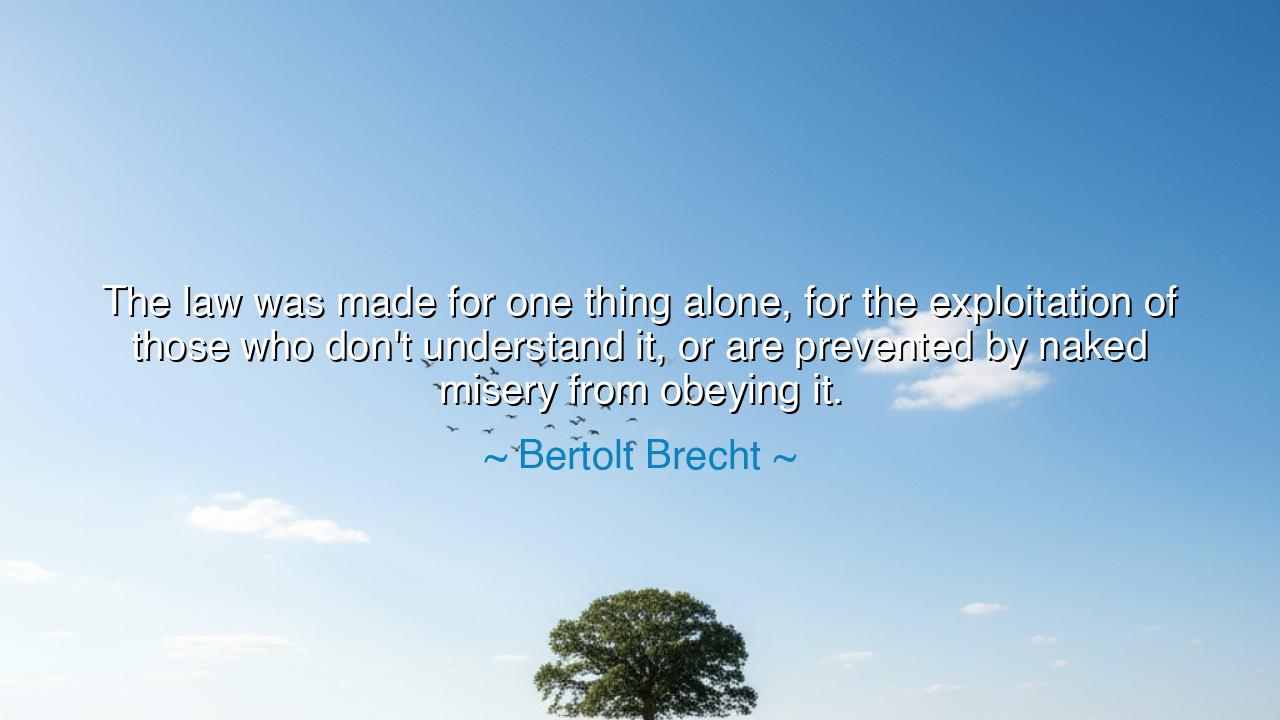
The law was made for one thing alone, for the exploitation of
The law was made for one thing alone, for the exploitation of those who don't understand it, or are prevented by naked misery from obeying it.






“The law was made for one thing alone, for the exploitation of those who don't understand it, or are prevented by naked misery from obeying it.” — Bertolt Brecht
In this fierce and unflinching statement, Bertolt Brecht, the revolutionary playwright and poet, unmasks the darker side of human civilization — the power hidden behind the law. To the ordinary ear, the word “law” sounds sacred, a symbol of justice and order. Yet Brecht, who lived through the chaos of war, tyranny, and poverty, saw how easily that sacred name could be twisted into a weapon. His words remind us that in a world divided by power, the law is not always the shield of the weak, but often the instrument of the strong.
Brecht wrote and spoke from the heart of a turbulent age — the rise of fascism in Europe, the hunger of the poor, and the corruption of ideals once thought eternal. He had seen with his own eyes how laws, crafted by hands in marble halls, could crush those who had never been invited inside. The poor, the uneducated, the hungry — these, he said, were trapped beneath the weight of laws they could neither read nor afford to disobey. For them, obedience was not a moral choice but a necessity born of misery. The law, in such times, became not the guardian of justice, but the mask of control.
This truth, harsh though it may seem, has echoed across the centuries. Think of the peasants of medieval Europe, bound by laws written in Latin — a language they could not understand. They were punished for trespassing on the very lands their ancestors had once freely walked, while their lords invoked “law” to justify chains of ownership. Or consider the slaves of the New World, whose bondage was once legal, whose cries for freedom were crimes. In each age, the pattern repeats: laws made by the powerful often serve to preserve their power, until conscience and courage rise to challenge them.
Yet Brecht’s words are not merely accusation — they are awakening. He calls us to see that ignorance of the law is not a failure of intelligence, but a design of oppression. Those who “do not understand it” are often those never taught, never included, never given a voice. Those “prevented by naked misery” are those for whom survival itself is rebellion. A starving man cannot obey the law that forbids him to steal bread; a homeless woman cannot respect the law that demands property. Brecht understood that morality cannot exist where necessity rules, and that true justice cannot be written by those who profit from despair.
And yet, even within this darkness, there shines a path for redemption. History shows that when the oppressed learn to understand the law, when they demand to write it for themselves, the world begins to turn. The Magna Carta, the Emancipation Proclamation, the movements for labor rights and civil equality — all were born from the struggle of the powerless to claim what the law had long denied them. The law, like iron, can be forged anew — but only in the fires of awareness, courage, and unity.
So, O seeker of justice, take heed: never worship the law blindly. Question it, study it, demand to know whom it serves. For as long as law remains the language of the few, the many will live in silence. But if you learn to wield it with understanding and compassion, it becomes what it was meant to be — not a whip, but a scale; not a chain, but a torch. Brecht’s warning is not meant to make us despair, but to make us see — to awaken in us the duty to make the law humane.
Therefore, remember this lesson: justice without mercy is tyranny, and law without conscience is mere machinery. Let your heart be the law of compassion, and your mind the defender of truth. Do not rest until the law serves all and exploits none — for only then shall humanity be free, and only then shall the name of justice regain its sacred meaning.






AAdministratorAdministrator
Welcome, honored guests. Please leave a comment, we will respond soon